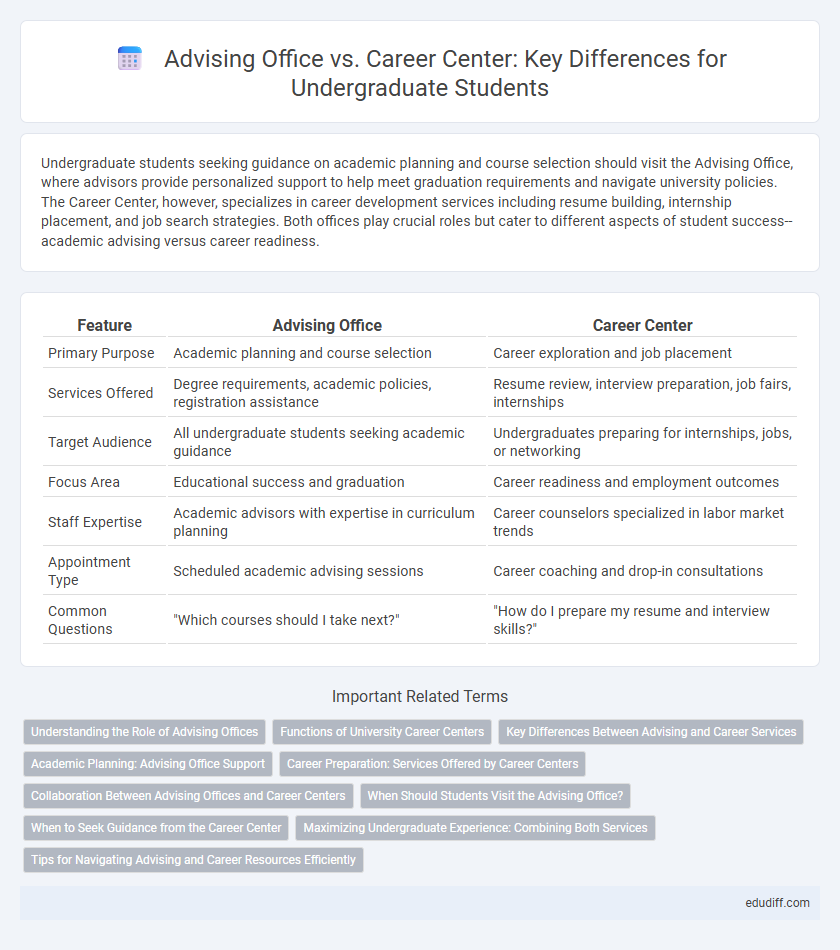Undergraduate students seeking guidance on academic planning and course selection should visit the Advising Office, where advisors provide personalized support to help meet graduation requirements and navigate university policies. The Career Center, however, specializes in career development services including resume building, internship placement, and job search strategies. Both offices play crucial roles but cater to different aspects of student success--academic advising versus career readiness.
Table of Comparison
| Feature | Advising Office | Career Center |
|---|---|---|
| Primary Purpose | Academic planning and course selection | Career exploration and job placement |
| Services Offered | Degree requirements, academic policies, registration assistance | Resume review, interview preparation, job fairs, internships |
| Target Audience | All undergraduate students seeking academic guidance | Undergraduates preparing for internships, jobs, or networking |
| Focus Area | Educational success and graduation | Career readiness and employment outcomes |
| Staff Expertise | Academic advisors with expertise in curriculum planning | Career counselors specialized in labor market trends |
| Appointment Type | Scheduled academic advising sessions | Career coaching and drop-in consultations |
| Common Questions | "Which courses should I take next?" | "How do I prepare my resume and interview skills?" |
Understanding the Role of Advising Offices
Advising offices primarily support undergraduate students by providing academic guidance, course selection assistance, and degree planning to ensure timely graduation. They help students navigate university policies and connect with campus resources, fostering academic success and personal development. Unlike career centers, which focus on professional preparation and job placement, advising offices concentrate on educational goals and curriculum requirements.
Functions of University Career Centers
University Career Centers provide essential services such as resume building, interview preparation, and job search strategies that directly support students' transition from academic life to professional careers. These centers facilitate connections with potential employers through job fairs, internship placements, and networking events tailored to various industries. Unlike Advising Offices, which primarily focus on academic course selection and degree progress, Career Centers emphasize practical career development and employment readiness.
Key Differences Between Advising and Career Services
Advising offices primarily focus on academic planning, course selection, and degree requirements to support students' educational progress, while career centers specialize in job search strategies, resume building, internships, and networking opportunities. Academic advising offers guidance tailored to students' academic goals and institutional policies, whereas career services provide resources geared toward professional development and employment readiness. Both services play complementary roles in facilitating student success by addressing distinct but interconnected aspects of academic and career planning.
Academic Planning: Advising Office Support
The Advising Office provides personalized academic planning tailored to individual undergraduate degree requirements, ensuring course selections align with graduation timelines and program goals. Advisors offer expert guidance on prerequisite fulfillment, major declaration, and navigating curriculum changes to optimize academic progress. This support complements career exploration but primarily centers on structured educational pathway development within the university.
Career Preparation: Services Offered by Career Centers
Career centers provide comprehensive career preparation services including resume reviews, interview coaching, and job search strategies tailored to undergraduate students. These centers offer internships, networking events, and career fairs connecting students with potential employers and industry professionals. Unlike advising offices that focus on academic planning, career centers specialize in equipping students with practical skills and resources for successful career entry.
Collaboration Between Advising Offices and Career Centers
Collaboration between advising offices and career centers enhances undergraduate support by integrating academic planning with career development, ensuring students align their coursework with professional goals. Joint workshops, personalized counseling, and coordinated resources facilitate seamless guidance, improving employment outcomes and student satisfaction. This partnership maximizes the utilization of institutional expertise, fostering a holistic approach to student success.
When Should Students Visit the Advising Office?
Students should visit the advising office primarily during course registration periods to receive personalized academic planning and ensure they meet graduation requirements efficiently. The advising office offers tailored guidance on selecting majors, minors, and electives aligned with students' academic goals and interests. Early and regular visits help prevent scheduling conflicts and provide support for academic challenges or petitioning for waivers.
When to Seek Guidance from the Career Center
Students should seek guidance from the Career Center when exploring job opportunities, preparing resumes, or practicing interview skills, as the center specializes in professional development and career readiness. The Career Center offers resources like job fairs, internship placements, and networking events that complement academic advising but focus specifically on career advancement. Engaging with the Career Center early in an undergraduate program enhances employment prospects and provides tailored advice for entering the workforce.
Maximizing Undergraduate Experience: Combining Both Services
Undergraduate students maximize their academic journey and professional growth by actively utilizing both the Advising Office and Career Center services. The Advising Office provides personalized academic guidance, helping students select courses aligned with their major and long-term goals, while the Career Center offers resources such as resume workshops, internship placements, and networking events essential for career readiness. Integrating support from these two entities ensures a comprehensive undergraduate experience, blending academic success with career preparedness for future employment opportunities.
Tips for Navigating Advising and Career Resources Efficiently
Maximize your academic success by scheduling regular appointments with both the Advising Office and Career Center; the Advising Office provides tailored course planning and graduation guidance, while the Career Center offers resume-building, internship placements, and interview preparation. Prepare specific questions and bring academic records to Advising sessions, and utilize the Career Center's workshops and networking events for industry connections. Integrating insights from both offices ensures well-rounded support for academic progression and career readiness.
Advising office vs Career center Infographic

 edudiff.com
edudiff.com